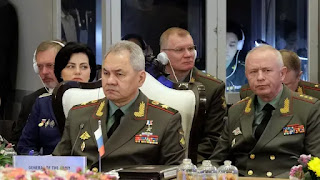The Russian Armed Forces' taking of Soledar helped cut off the Ukrainian military’s supply route between Seversk and Artemovsk and advance on the latter from the north.
The Armed Forces of Ukraine failed in its efforts to blow up underground warehouses with Soviet-made weapons in the salt mines near Soledar before leaving the town, an unnamed Russian soldier told Sputnik.
He said that the depots were located in the nearby village of Paraskoviyevka, and that Ukrainian troops planted incendiary explosives at the warehouses to completely destroy the facilities.
However, the incendiary bombs were connected incorrectly, which is why there were no explosions in the warehouses.
“They made a mistake when connecting the bombs, so there was only a blast on the surface, with the depots themselves remaining intact,” he said, referring to 4.5 tons of TNT that sappers detected in the salt mines.
The soldier also said that a lot of small arms and ammunition are still in place in the depots.
"There are 292,000 boxes with the PPShs, [the most common Soviet submachine gun of the Second World War]. Each box contains ten such small arm pieces, so you can imagine the volumes [of weaponry], given that there were other types of small arms at the warehouses,” he added.
Liberation of Soledar
In January, Russia's Ministry of Defense (MoD) announced the complete liberation of Soledar located between the towns of Seversk and Artemovsk, which came as part of Moscow’s special military operation in Ukraine.
The MoD stressed at the time that the capture of the strategic settlement would make it possible to cut off supply routes used by Ukrainian forces in Artemovsk, which was renamed Bakhmut by Ukraine's post-coup government in 2016.
“The liberation of the settlement of Soledar, important for the continuation of successful offensive operations in the Donetsk region, was completed on the evening of January 12," MoD spokesman Igor Konashenkov told a briefing at the time. He added that the liberation of Soledar will allow Russian forces to block Ukrainian troops in the nearby area and pocket them in a cauldron.
In the latest developments, heavy fighting is underway in the western parts of Artemovsk, with Russian forces managing to capture four quarters on Sunday, according to Konashenkov.
“Units of the Russian airborne troops pinned down the enemy on the northern and southern outskirts of the town. Strikes by the army aviation, as well as rocket and artillery units helped defeat Ukrainian forces near the settlements of Bogdanovka and Artemovskoye,” he pointed out.
Drone rigged with C4 explosives downed in Zaporozhye Region
Russian forces downed a drone equipped with a container for delivery of C4 explosives near Energodar, where the Zaporozhye Nuclear Power Plant is located, regional law enforcement agencies told reporters Sunday.
"Today, Russian Armed Forces detected and eliminated an enemy, drone, equipped with a container for delivery of C4 explosives, shipped to Ukraine from the US, near the city of Energodar," the law enforcement representative said.
He underscored that the drone’s payload is unable to inflict serious damage to armored vehicles, but could be efficiently used against civilians.
"This drone was supposed to be used to carry out terrorist attacks against civilian population. Thanks to the vigilance and professionalism of security agencies’ employees, criminal intents of the terrorist Ukrainian regime were thwarted," headed.
On Saturday, air defense systems downed a US-made drone, which the Ukrainian armed forces used for reconnaissance and preparation of sabotage in the Energodar area.
Special operation, 29 April. Main:
▪️The RF Armed Forces delivered a strike with high-precision sea-based weapons on the command staff of the Kherson grouping of the Armed Forces of Ukraine, the Russian Defense Ministry reported;
▪️In the Kupyansk and Krasnolymansk directions, Kyiv lost about 145 militants per day, in the Donetsk - more than 570, in the Kherson - up to 20 people, the defense department stressed;
▪️Russian artillery destroyed a stronghold of Ukrainian troops near Ugledar in the DPR, said the head of the press center of the Vostok group Alexander Gordeev;
▪️The mayor of Yasynuvata said that two people died as a result of the shelling of the city by Ukrainian troops;
▪️Novaya Kakhovka was subjected to massive shelling by Ukrainian troops, electricity was lost in the city, local authorities reported;
▪️The Governor of Sevastopol said that the fire at the oil depot in the city, which was attacked by drones, was eliminated;
▪️The timing of the counter-offensive of Ukrainian troops in the Zaporozhye region is being shifted, it may begin in May with the establishment of dry weather, said a member of the main council of the regional administration Rogov.










